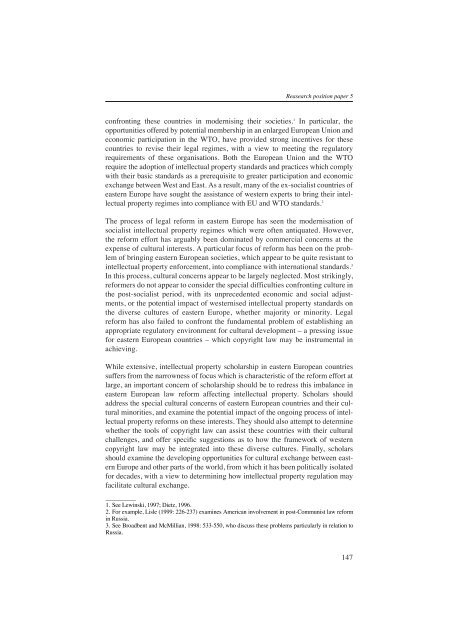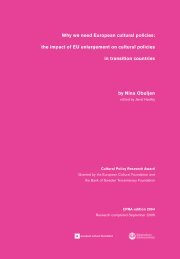<strong>Differing</strong> <strong>diversities</strong>works, and the impact <strong>of</strong> authors’ moral rights on creativity and culture remainhighly controversial. While these issues are too complex to lend themselvesdirectly to empirical analyses, a more sophisticated examination <strong>of</strong> what theyinvolve, including their empirical aspects, may help policy makers to frame culturaldiversity policies far more effectively.Relationship between international copyright and regional copyrightThe study <strong>of</strong> international developments in intellectual property has also largelyneglected the relationship between international copyright law and regionalapproaches to copyright. Notably, the <strong>Europe</strong>an Union has been a major site <strong>of</strong> developmentin copyright standards, where efforts to harmonise the laws <strong>of</strong> member statesare embodied in five copyright harmonisation directives, to date. 1 <strong>Europe</strong>an copyrighthas developed in tandem with the TRIPs/WTO system. 2 Its influence on internationalintellectual property law may be significant, particularly in view <strong>of</strong> the importance <strong>of</strong>trade in culture and technology between <strong>Europe</strong>an Union countries and the UnitedStates. 3 Moreover, the question <strong>of</strong> how <strong>Europe</strong>an Union copyright law interacts withthe TRIPs Agreement remains largely unresolved (Caviedes, 1998: 228).<strong>Europe</strong>an intellectual property developments have also been driven by the need tointegrate the formerly socialist countries <strong>of</strong> eastern <strong>Europe</strong> into the ambit <strong>of</strong> the<strong>Europe</strong>an Union. These countries may either be admitted directly to full <strong>Europe</strong>anUnion membership, 4 or they may participate in agreements which facilitate trade andcultural exchange with the EU. 5 The new legal perspectives and different culturalrealities which these countries may introduce into the international copyright regimeremain poorly explored. In particular, the highly publicised, potential membership <strong>of</strong>the Russian Federation in the WTO, and the recent admission <strong>of</strong> China to the WTOclub, may bring unexpected pressures to bear on the international framework forcopyright protection. These countries bring to the international arena a historicallegacy <strong>of</strong> oppression, a complex and distinguished cultural past, and notoriously lowlevels <strong>of</strong> compliance with current copyright standards. These factors may generate aneed to re-examine conventional wisdom about the desirability and effectiveness <strong>of</strong>the international copyright standards established in the TRIPs Agreement.<strong>Europe</strong>an integration, culture, and copyrightWith the collapse <strong>of</strong> socialist regimes in eastern <strong>Europe</strong> and the former SovietUnion, intellectual property specialists have become interested in the problems__________1. The directives are summarised by Caviedes (1998: 207-221).2. Caviedes (1998: 166-168) emphasises this point.3. This point is made by Crews (1998: 117).4. But see Karel, 1997: 221-222. He points out that the expansion <strong>of</strong> the EU depends on the economic situation<strong>of</strong> the Union, and, therefore, may not become a reality for some time: he observes that the accessionprocess has so far been characterised by “vague words” and “ill-defined assurances” from the EU, inlieu <strong>of</strong> specific commitments.5. The Russian Agreement on Partnership and Co-operation with the <strong>Europe</strong>an Union <strong>of</strong> 1994 is oneexample: see Elst, 1996: 276-285.146
Reasearch position paper 5confronting these countries in modernising their societies. 1 In particular, theopportunities <strong>of</strong>fered by potential membership in an enlarged <strong>Europe</strong>an Union andeconomic participation in the WTO, have provided strong incentives for thesecountries to revise their legal regimes, with a view to meeting the regulatoryrequirements <strong>of</strong> these organisations. Both the <strong>Europe</strong>an Union and the WTOrequire the adoption <strong>of</strong> intellectual property standards and practices which complywith their basic standards as a prerequisite to greater participation and economicexchange between West and East. As a result, many <strong>of</strong> the ex-socialist countries <strong>of</strong>eastern <strong>Europe</strong> have sought the assistance <strong>of</strong> western experts to bring their intellectualproperty regimes into compliance with EU and WTO standards. 2The process <strong>of</strong> legal reform in eastern <strong>Europe</strong> has seen the modernisation <strong>of</strong>socialist intellectual property regimes which were <strong>of</strong>ten antiquated. However,the reform effort has arguably been dominated by commercial concerns at theexpense <strong>of</strong> cultural interests. A particular focus <strong>of</strong> reform has been on the problem<strong>of</strong> bringing eastern <strong>Europe</strong>an societies, which appear to be quite resistant tointellectual property enforcement, into compliance with international standards. 3In this process, cultural concerns appear to be largely neglected. Most strikingly,reformers do not appear to consider the special difficulties confronting culture inthe post-socialist period, with its unprecedented economic and social adjustments,or the potential impact <strong>of</strong> westernised intellectual property standards onthe diverse cultures <strong>of</strong> eastern <strong>Europe</strong>, whether majority or minority. Legalreform has also failed to confront the fundamental problem <strong>of</strong> establishing anappropriate regulatory environment for cultural development – a pressing issuefor eastern <strong>Europe</strong>an countries – which copyright law may be instrumental inachieving.While extensive, intellectual property scholarship in eastern <strong>Europe</strong>an countriessuffers from the narrowness <strong>of</strong> focus which is characteristic <strong>of</strong> the reform effort atlarge, an important concern <strong>of</strong> scholarship should be to redress this imbalance ineastern <strong>Europe</strong>an law reform affecting intellectual property. Scholars shouldaddress the special cultural concerns <strong>of</strong> eastern <strong>Europe</strong>an countries and their culturalminorities, and examine the potential impact <strong>of</strong> the ongoing process <strong>of</strong> intellectualproperty reforms on these interests. They should also attempt to determinewhether the tools <strong>of</strong> copyright law can assist these countries with their culturalchallenges, and <strong>of</strong>fer specific suggestions as to how the framework <strong>of</strong> westerncopyright law may be integrated into these diverse cultures. Finally, scholarsshould examine the developing opportunities for cultural exchange between eastern<strong>Europe</strong> and other parts <strong>of</strong> the world, from which it has been politically isolatedfor decades, with a view to determining how intellectual property regulation mayfacilitate cultural exchange.__________1. See Lewinski, 1997; Dietz, 1996.2. For example, Lisle (1999: 226-237) examines American involvement in post-Communist law reformin Russia.3. See Broadbent and McMillian, 1998: 533-550, who discuss these problems particularly in relation toRussia.147
- Page 5 and 6:
PrefaceThe present text constitutes
- Page 7:
Part IDiffering diversities:transve
- Page 11 and 12:
The study: background, contextand m
- Page 13 and 14:
Transversal study on the theme of c
- Page 15:
Transversal study on the theme of c
- Page 18:
Differing diversitiesi. new forms o
- Page 23 and 24:
IntroductionTransversal perspective
- Page 25 and 26:
Transversal study on the theme of c
- Page 27 and 28:
The challenge of diversityCulture,
- Page 29 and 30:
Transversal study on the theme of c
- Page 31 and 32:
Transversal study on the theme of c
- Page 33 and 34:
Diversity, citizenship, and cultura
- Page 35 and 36:
Transversal study on the theme of c
- Page 37:
Transversal study on the theme of c
- Page 40 and 41:
Differing diversitieslanguages. The
- Page 42 and 43:
Differing diversitiesprogrammes int
- Page 45 and 46:
Culture, government and diversity:p
- Page 47 and 48:
Transversal study on the theme of c
- Page 49 and 50:
Transversal study on the theme of c
- Page 51 and 52:
Transversal study on the theme of c
- Page 53:
Transversal study on the theme of c
- Page 56 and 57:
Differing diversitiesin the pursuit
- Page 58 and 59:
Differing diversitiesthe need for m
- Page 60 and 61:
Differing diversitiescircumstances
- Page 62 and 63:
Differing diversitiesclasses artist
- Page 64 and 65:
Differing diversitiesMy point, then
- Page 66 and 67:
Differing diversitiesiii. that the
- Page 69:
Transversal study on the theme of c
- Page 73 and 74:
The consequences of European media
- Page 75 and 76:
Reasearch position paper 1and contr
- Page 77 and 78:
Reasearch position paper 1directly
- Page 79 and 80:
Reasearch position paper 1There hav
- Page 81 and 82:
Reasearch position paper 1presence
- Page 83 and 84:
Reasearch position paper 1Strategic
- Page 85 and 86:
Reasearch position paper 1New media
- Page 87 and 88:
Reasearch position paper 1Blumler,
- Page 89 and 90:
Reasearch position paper 1Hoffmann-
- Page 91 and 92:
Reasearch position paper 1Pauwels,
- Page 93 and 94:
Assessing the implementationof cult
- Page 95 and 96: Reasearch position paper 2tics abou
- Page 97 and 98: Reasearch position paper 2Act (GPRA
- Page 99 and 100: Reasearch position paper 2factually
- Page 101 and 102: Reasearch position paper 2The evalu
- Page 103 and 104: Reasearch position paper 2capacity
- Page 105 and 106: Reasearch position paper 2Luchtenbe
- Page 107 and 108: The cultural policies of the Europe
- Page 109 and 110: Reasearch position paper 3went, wou
- Page 111 and 112: Reasearch position paper 3The histo
- Page 113 and 114: Reasearch position paper 3integrati
- Page 115 and 116: Reasearch position paper 3of differ
- Page 117 and 118: Reasearch position paper 3European
- Page 119 and 120: Reasearch position paper 3voice to
- Page 121: Reasearch position paper 3Howe, Mar
- Page 124 and 125: Differing diversitiesContemporary d
- Page 126 and 127: Differing diversitiesWhereas in the
- Page 128 and 129: Differing diversitiesbuilding on th
- Page 130 and 131: Differing diversitieswhen tackling
- Page 132 and 133: Differing diversitiesand that is pr
- Page 134 and 135: Differing diversitiesSennett, Richa
- Page 136 and 137: Differing diversitiesallowing their
- Page 138 and 139: Differing diversitiesNevertheless,
- Page 140 and 141: Differing diversitiesgrowth also ex
- Page 142 and 143: Differing diversitiesAt a deeper le
- Page 144 and 145: Differing diversitiesconventional c
- Page 148 and 149: Differing diversitiesNational sover
- Page 150 and 151: Differing diversitiesSimilarly, at
- Page 152 and 153: Differing diversitiesCoombe, Rosema
- Page 154 and 155: Differing diversitiesWoodmansee, Ma
- Page 156 and 157: Differing diversitiesIndeed, which
- Page 158 and 159: Differing diversitiesThe second maj
- Page 160 and 161: Differing diversitiesexample by Hol
- Page 162 and 163: Differing diversitiesincreased broa
- Page 164 and 165: Differing diversities“Black Carib
- Page 166 and 167: Differing diversitiesBunt, Gary, 19
- Page 169 and 170: Preserving cultural diversity throu
- Page 171 and 172: Reasearch position paper 7unique, t
- Page 173 and 174: Reasearch position paper 7legislati
- Page 175 and 176: Reasearch position paper 7appropria
- Page 177 and 178: Reasearch position paper 7Indeed, m
- Page 179 and 180: Reasearch position paper 7- means t
- Page 181 and 182: Reasearch position paper 7cyberspac
- Page 183 and 184: Reasearch position paper 7extended
- Page 185 and 186: Reasearch position paper 7It is rec
- Page 187 and 188: Reasearch position paper 7lose loca
- Page 189 and 190: Reasearch position paper 7six proje
- Page 191 and 192: Reasearch position paper 7and innov
- Page 193 and 194: Reasearch position paper 7Programme
- Page 195 and 196: Reasearch position paper 7Reference
- Page 197 and 198:
Reasearch position paper 7Papers on
- Page 199:
Reasearch position paper 7Swaminath
- Page 202:
Sales agents for publications of th














